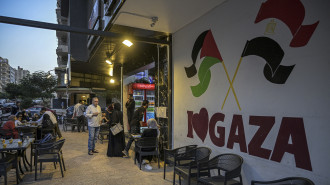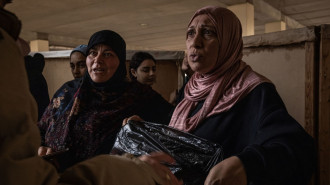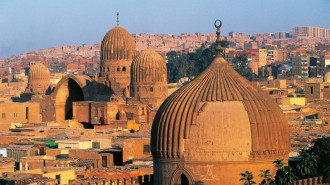
Caught between the right and a hard place: French Muslims are cannon-fodder in electoral ‘reign of terror’

Moments after stepping off the platform at Paris’s Gard Du Nord, a swarm of French police scurried past to intercept a group of North African youth.
Outnumbering the teens by a ratio of 3:1, the police proceeded to usher them into a corner of the underpass separating the train station from the street, where they were then detained.
For those living in Europe’s metropolitan centres, such instances of demographic profiling are not uncommon. But what struck me about this particular afternoon in Paris was the eeriness by which events then unfolded. Watching on, pleas of innocence were struck down as if a sedative had been administered, with the group’s facial expressions quickly contorting into a look of resignation.
There was an inevitability about it all as if both were playing cops and robbers – the ‘good’ state triumphing over the ‘evil’ other.
Admittedly, whether or not their look of resignation was a marker of guilt felt at the time like a secondary concern. Having arrived in Paris on the same day that CAGE released its report We Are Beginning To Spread Terror, the event instead felt somewhat allegorical.
"With the combined votes for French right-wing candidates currently polling at 70-75%, how did we get here?"
As the 2022 French elections draw nearer, its politicians are currently embroiled in a race to the bottom: who can ostracize France’s Muslim population the most.
The logic behind their playbook is tried and tested on the European stage. One of the focal topics of April’s general election is immigration and while discussing it, the main talking point quickly becomes that of assimilation, which in turn leads to a discussion of ‘values’ and unreasonable citizens.
In the French context, the unreasonable citizen almost invariably refers to Muslims or people of African or Arab descent.
Perhaps unsurprisingly then, President Emmanuel Macron’s biggest threat comes from a resurgent, multidimensional right. And not to be out-done, or lose grip of this increasing voter base, centre-right candidate Macron has employed a slew of tactics to pander to the bloc.
Prompted by the gruesome murder of French schoolteacher Samuel Paty in October 2020 by Abdoullakh Anzorov, Macron has fast-tracked a number of measures which, while purporting to support “republican values”, has instead laid a legislative base for the collective punishment of France’s Muslim community.
The Anti-Separatism Bill passed on 27 August 2021 is of particular note but is by no means alone in effect.
Yet, it would seem that even draconian laws have failed to quench the thirst of Macron’s Islamophobic rivals. Not content with his overtures, presidential candidates Valérie Pécresse and Eric Zemmour have instead chosen to invoke a more genocidal tone in their campaign rallies through the promotion of the “Great Replacement Theory” – a theory which has now seeped into the mainstream consciousness.
With the combined votes for French right-wing candidates currently polling at 70-75 percent, how did we get here?
How is it that Phillipe Marlière, Professor of French and European Studies at UCL, can call Islamophobe and presidential candidate Eric Zemmour a “creature of the French establishment?" Does this shift to the right have its roots in France’s revolutionary history and colonial experience? And what does this all mean for France’s Muslim community who are bombarded with hate, restricted from practice and fearful of their futures?
Laïcité: Paradoxes and prejudice
We wouldn't get much further in our discussion of Islamophobia in France without first expanding upon ‘Laïcité’, France’s unique brand of secularism and a foundational pillar of its socio-political agenda.
As described by CAGE report author Rayan Freschi, whilst France’s status as a secular republic ensures the explicit division of religion and state, one shouldn’t “simply regard it [secularism] as a neutral form of government”.
Rather it is Laïcité, as the ideological embodiment of the French Revolution, that acts as the country’s civil religion and in doing so polices against “erroneous beliefs” such as the explicit expression of religious behaviours, rituals, and practices.
"[French] values that profess social harmony quickly break down when examined against what’s happening on the ground"
This French form of Universalism had been broadly accepted by its population up until the mid-20th century, with little legislative dispute.
However, decolonisation movements and the arrival of Muslims from former French colonies in West and North Africa presented the legal framework – in particular the 1905 law which definitively sealed the end of “recognised religions” – with a challenge.
France's chickens came home to roost.
Fast-forward to the present day and France – with its 10 percent Muslim population – tussles to regulate and reform Islam through institutional, legislative, and architectural entrapment.
Here are some examples. In 1989, disputes began over whether Muslim girls should be allowed to wear headscarves in schools. In 2004, new laws were passed banning people from wearing conspicuous religious symbols. Then in 2010, a law was passed banning face coverings in public spaces and five years later, a French court disregarded Muslim dietary restrictions.
This list is passing evidence of the shrinking space for Muslims to normatively practice their faith all in the name of “republican values”. And yet, these values quickly break down when examined against what’s happening on the ground.
Take France’s system of urban planning. Rather than integrating government-assisted homes throughout the city, France has adopted a more isolated form with the creation of banlieues on the outskirts of cities.
This “out of sight, out of mind” policy of urban segregation, voluntarily established and imposed by the state, coincided with the first waves of Muslim immigration.
Speaking to The New Arab, French jurist Rayan Freschi argues that the system “helped the state's depiction of Muslims as a security and a civilisational threat, while facilitating a close and brutal form of policing that clears the path to the carceral system.
"This segregation helps foster Muslim invisibility, dehumanisation, and serves as a pretext for state violence. As a result, the tacit aim is the social death of Muslims, with this system deeply grounded in France’s own colonial history.”
"Devoid of ideas to integrate its Muslim community beyond strained dogma, France, like so many other European countries, turned to paranoid, pre-emptive policies to police its Muslim community"
This meshing of legislative and social discrimination has no doubt helped create a political environment where Muslims are the unreasonable 'invisible', a security threat, and a community plagued by socio-economic degradation – and these factors would worsen after 9/11 and the War on Terror.
Systematic Obstruction Policy: Suspicion to surveillance
France’s involvement in the War on Terror gifted its politicians and legislature with a convenient way to counter “the threat within”.
Devoid of ideas to integrate its Muslim community beyond strained dogma, France like so many other European countries turned to paranoid, pre-emptive policies to police its Muslim community.
The United Kingdom’s Prevent strategy would set a worrying precedent and opened up an Islamophobic Pandora’s Box for France to follow. Notable cases of Islamist attacks: the Charlie Hebdo murders, the Bataclan bombing, and others gave the French executive all the legitimacy it needed to frame Muslims as a threat en masse.
|
Wilfully skipping over whether policies and illegal occupations overseas may have played a role in the motivation for these attacks, Nicholas Sarkozy, Francois Hollande, and Emmanuel Macron have imposed two tactics that work hand-in-hand in monitoring France’s Muslim population.
Firstly, Muslim institutions subservient to the French government are strengthened and are ever-present in the public eye as “the official Muslim voice”.
The Paris Mosque is one such example.
With particular reference to the Mosque's role in French affairs, Rayan Freschi told The New Arab that “established during the colonial era, The Paris Mosque has always mirrored – in one way or another – the political positions that the French state allowed or suggested.
"Represented by Chems-Eddine Hafez – a Franco-Algerian lawyer with no religious academic background – the Mosque functions as a political cover for the French state and is used to promote a corrupted version of Islam that is completely void of any ability to dissent.”
This view is echoed by Dr Farid Hafez, Visiting Professor of International Affairs at Williams College and an expert on European counter-terrorism policies.
In a statement to The New Arab, Farid said that the aim is to create “a French Islam that submits to the French will of those in power, with no unique political agency. It is one that is silent upon oppression and submits to the French will of what Islam should look like.”
For mosques, Muslim-run NGOs and Islamic schools that dare question the imposed narrative, the state employs its second tactic: the Systematic Obstruction policy.
CAGE’s recently published report We Are Beginning To Spread Terror is the most detailed account that we have on the policy and its effects.
Initially a covert operation, the Systematic Obstruction policy has granted the French state vast powers to monitor, dissolve and seize funds in the name of combatting “Islamism and/or Separatism”.
"Opposing the French government's policies could now lead to a mosque being closed, an Imam being revoked, or a school being raided"
Operational since 2019, the policy functions through Al Capone-style policing where Muslim institutions can be subject to controls and inspections on bureaucratic grounds. Minor infractions of health and safety can, for example, be used to legitimise sanctions.
As of January 2022, 24,887 Systematic Order controls have been carried out, with 718 Muslim organisations closed, including (at least): four schools, 37 mosques, 210 businesses, and 12 charities. This has amounted to the French state seizing assets worth 46 million euros.
This dangerous concoction of Islamophobia with maximum pressure has led to more and more Islamic institutions surrendering to the state as a matter of survival.
Opposing the French government's policies could now lead to a mosque being closed, an Imam being revoked, or a school being raided.
Such fears, when coupled with the weaponizing effects of the Anti-Separatism Bill, only contributes to French Muslims feeling increasingly insecure in their own country.
Endgame export?
A rising tide of anti-migrant and Islamophobic sentiment now grips the European continent. Both France and the UK have sought to export their respective systems of repression in what they label “a united front” against Islamism.
Worryingly, there continues to be a reciprocal validation of authoritarianism taking place between these European countries and oppressive regimes, with the sharing of strategies as a means to justify their policies.
The rise of candidates like Eric Zemmour and youth-movement Génération Identitaire also prove that for a vast demographic the Anti-Separatism Bill and the Systematic Obstruction are not only endorsed but fall far short of their expectations of what should be done.
As for Muslims in France, the upcoming elections is a harsh reminder they remain public enemy number one. While some may choose to vote for the left – Jean-Luc Mélenchon to be specific – they will inevitably be forced to vote against whichever far-right candidate Macron is likely to face. Others will not vote at all.
“If left unaddressed, the persecution of Muslims can only deepen. It is not only about laws and policies, but also the psychological impact of an increasingly narrow religious, intellectual, legal, and political space. Muslims are understandably frightened, exhausted, and disillusioned,” Rayan says.
I think back to those boys at the train station. What will their future hold? Which path will they choose?
Optimism and hope are never lost but as the ability to create an independent political Muslim voice wanes day by day, we’re losing the ability to create a safe space in real-time.
Benjamin Ashraf is a Visiting Research Fellow at the University of Jordan’s Center for Strategic Studies. He is also part of The New Arab’s Editorial Team.
Follow him on Twitter: @ashrafzeneca

![Palestinians mourned the victims of an Israeli strike on Deir al-Balah [Getty]](/sites/default/files/styles/image_684x385/public/2024-11/GettyImages-2182362043.jpg?h=199d8c1f&itok=xSHZFbmc)


![The law could be enforced against teachers without prior notice [Getty]](/sites/default/files/styles/image_684x385/public/2178740715.jpeg?h=a5f2f23a&itok=hnqrCS4x)
 Follow the Middle East's top stories in English at The New Arab on Google News
Follow the Middle East's top stories in English at The New Arab on Google News


